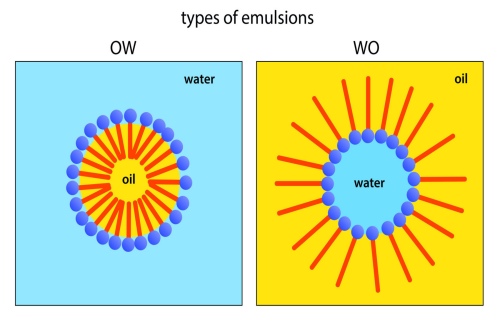The Science Behind Emulsifiers and Their Importance in Modern Production
Emulsifiers play a vital role in modern-day production, working as the unsung heroes that mix oil and water for a wide variety of products. You may not recognize how these substances boost texture and stability, but their influence is considerable throughout markets. As consumer choices shift in the direction of cleaner tags, the demand for ingenious emulsifiers is expanding. What does this mean for the future of item formulation? Let's discover better.
What Are Emulsifiers?
Emulsifiers are crucial agents in the globe of food and item manufacturing, acting as the adhesive that binds two or else immiscible liquids, like oil and water. Typical examples include lecithin found in egg yolks and soybeans, and mono- and diglycerides utilized in numerous refined foods.

When you whip up a salad clothing or indulge in a velvety treat, emulsifiers help preserve that perfect appearance. Without emulsifiers, numerous foods would certainly separate, leading to unwanted structures and tastes.
The Chemistry of Emulsification
When you blend oil and water, you may discover they don't mix easily; that's where the chemistry of emulsification comes into play. To overcome this difficulty, emulsifiers are utilized.
These molecules have a hydrophilic (water-attracting) head and a hydrophobic (water-repelling) tail. When you include an emulsifier, its particles place themselves at the oil-water user interface, decreasing surface tension and permitting the beads to mix. The emulsifier creates a protective layer around each bead, preventing them from coalescing back into different layers. Recognizing this chemistry is important for achieving security in products like dressings, creams, and sauces, making emulsification crucial in contemporary production.
Kinds of Emulsifiers
Numerous types of emulsifiers play necessary duties in supporting blends of oil and water. Natural emulsifiers, like lecithin from egg yolks or soy, are acquired from plants and animals, making them prominent in food items.
On the other hand, synthetic emulsifiers, such as mono- and diglycerides, are chemically crafted to boost stability and service life. They're typically used in refined foods and cosmetic items.
In addition, you may encounter non-ionic, anionic, and cationic emulsifiers, each with distinct residential properties that influence their performance. Non-ionic emulsifiers, as an example, job well in a large range of pH degrees, while anionic emulsifiers have a tendency to perform much better in alkaline problems. Recognizing these types can help you pick the best emulsifier for your details application.
Mechanisms of Emulsion Formation
Comprehending how emulsions form is essential for creating steady mixes of oil and water. When you present an emulsifier, it minimizes the surface area stress in between the 2 liquids, enabling them to mix even more easily.
The emulsifier molecules have a hydrophilic (water-attracting) head and a hydrophobic (oil-attracting) tail. When you include an emulsifier, these particles arrange themselves at the oil-water user interface. The hydrophilic heads communicate with water, while the hydrophobic tails anchor right into the oil. This develops an obstacle that supports the droplets, stopping them from coalescing.
Applications of Emulsifiers in Different Industries
Emulsifiers play a vital function across various sectors, making your favorite foods smoother and much more satisfying. In cosmetics, they enhance product structure and stability, making sure a positive application experience. Plus, in drugs, they aid supply necessary active ingredients properly, enhancing total efficacy.
Food Market Uses
While you may not understand it, emulsifiers play an essential function in the food industry, improving the texture, security, and shelf life of several products. In baked goods, emulsifiers improve dough handling and keep wetness, resulting in a much better structure and prolonged freshness. By guaranteeing uniformity and quality, emulsifiers are significant to delivering the delicious products you take pleasure in every day, making them a crucial active ingredient in modern-day food production.
Cosmetic Formulas Benefits
When it concerns cosmetic solutions, emulsifiers are important for producing products that feel article luxurious and carry out efficiently. They help mix oil and water, making certain a smooth and secure consistency in creams, lotions, and serums. You'll see that emulsifiers boost product stability, preventing separation and lengthening rack life. This implies you can enjoy your favored moisturizer without worrying concerning it spoiling as well quickly. In addition, emulsifiers enhance the application experience, enabling also check over here circulation and much better absorption into the skin. By utilizing emulsifiers, you also attain a more enticing structure, making your cosmetics feel fascinating on your skin. On the whole, emulsifiers play a crucial role in supplying premium cosmetic items that fulfill your appeal needs.
Drug Applications Review
In the pharmaceutical market, emulsifiers are important for formulating efficient medications. You'll locate emulsifiers in numerous dose kinds, like lotions, lotions, and liquid suspensions, improving the bioavailability of medications.
The Influence of Emulsifiers on Item Top Quality

By guaranteeing secure emulsions, you decrease the threat of perishing and extend service life, ultimately saving you money and time. You'll also find that emulsifiers can improve the bioavailability of active ingredients in your products, making redirected here them much more reliable for consumers.
Additionally, they enable you to produce ingenious formulas that satisfy varied customer demands. Whether you're crafting a luscious clothing or a lavish cream, emulsifiers are crucial for attaining the wanted outcomes. In brief, by recognizing and leveraging the influence of emulsifiers, you can substantially boost the high quality of your products.
Future Trends in Emulsifier Development
As the demand for cleaner tags and lasting products rises, the growth of brand-new emulsifiers is readied to develop considerably. You'll notice a change towards plant-based and natural emulsifiers, driven by customer preferences for components that are ecologically pleasant and less processed. Developments in biotechnology will likely enhance the capability and effectiveness of these emulsifiers, allowing producers to create secure formulas with fewer additives.
You might additionally see a boost in multifunctional emulsifiers that not only maintain emulsions yet also boost taste, texture, or dietary worth. This trend can streamline active ingredient listings while boosting product efficiency.
Additionally, with advancements in nanotechnology, emulsifiers can be engineered at the molecular degree to accomplish unprecedented security and effectiveness. Emulsifiers. As you check out these trends, you'll discover that the future of emulsifier development is not nearly performance, but likewise concerning embracing sustainability and transparency in active ingredients
Regularly Asked Concerns
Are Emulsifiers Safe for Consumption in Food Products?
Yes, emulsifiers are generally secure for usage in foodstuff. They've been thoroughly researched and approved by food safety authorities, so you can appreciate your favored foods without fretting regarding their impact on your health and wellness.
Can Emulsifiers Be Derived From Natural Resources?
Yes, you can acquire emulsifiers from natural sources. Active ingredients like lecithin from egg yolks or soybeans and casein from milk are common. These natural emulsifiers assist maintain mixes without artificial additives, making them prominent in different items.

Just How Do Emulsifiers Impact Service Life of Products?
Emulsifiers maintain blends, preventing splitting up and spoilage - Emulsifiers. By preserving uniformity, they extend items' life span, making sure freshness and high quality. You'll notice that emulsifiers assist keep your favored foods and cosmetics carrying out more than time
What Are Possible Side Impacts of Emulsifiers?
You could experience digestive problems when consuming items with emulsifiers, as they can disrupt digestive tract microorganisms. Some studies recommend possible links to inflammation or allergies, yet more research study is required to totally understand these effects.

Exist Alternatives to Standard Emulsifiers?
Yes, there are alternatives to standard emulsifiers. You can explore choices like all-natural periodontals, starches, or lecithin. Each alternate offers unique buildings, so experiment to discover what jobs best for your specific application.